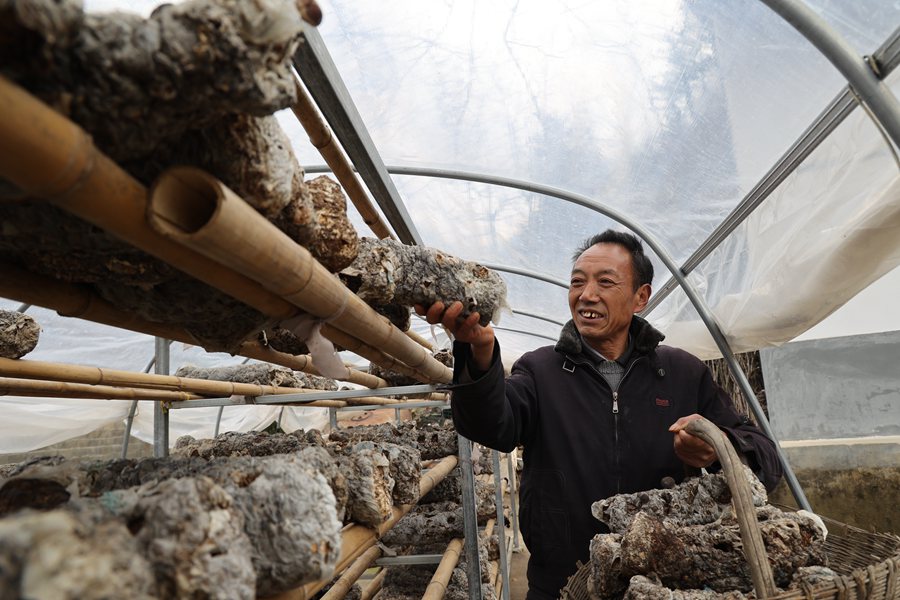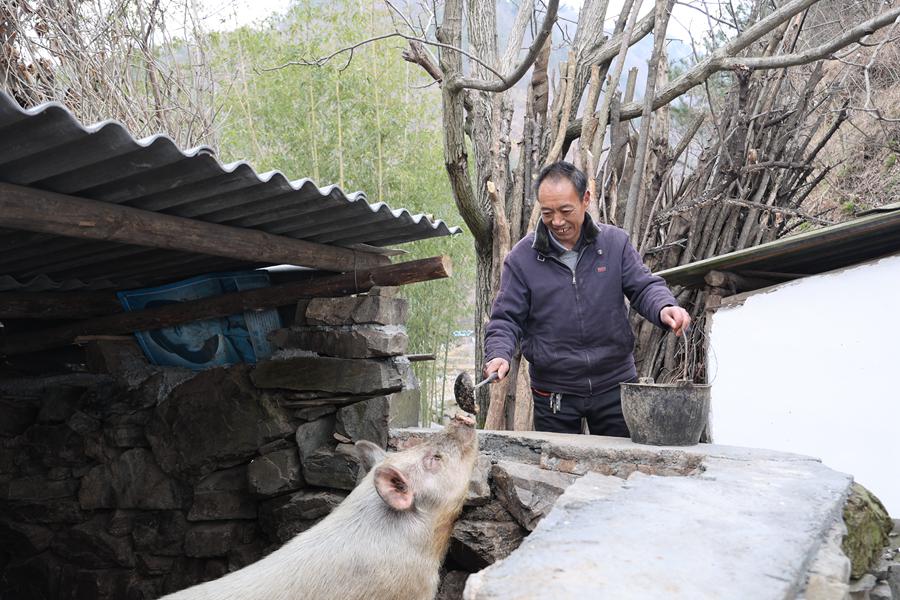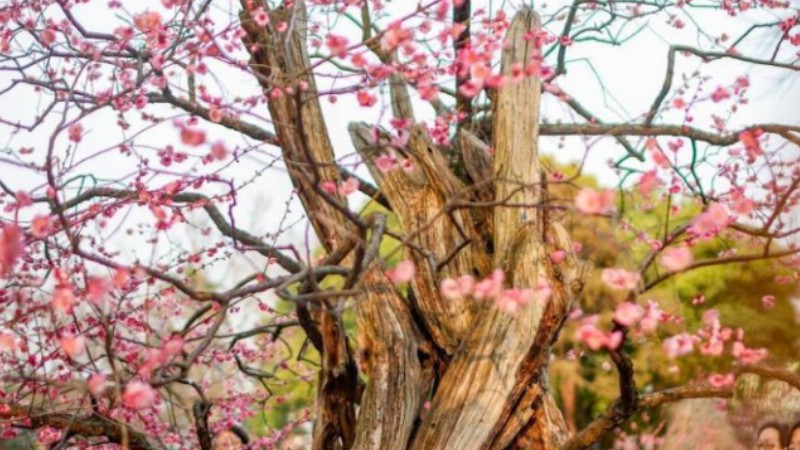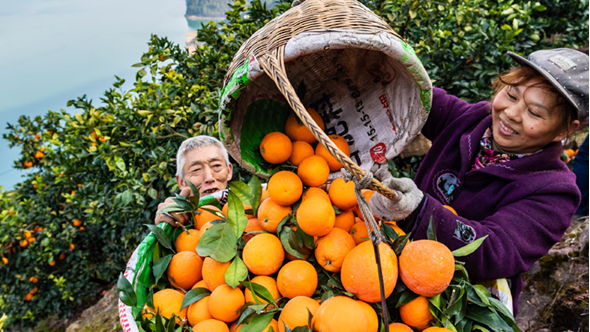Targeted local govt support leads poor NW China villagers to prosperity
"I'm going to buy new mushroom sticks soon. Don't underestimate them. With very little space, I made more than 2,000 yuan ($288) by growing shiitakes last year," Yang Changcun told People's Daily as he collected old mushroom sticks inside a shed in his yard.
The 64-year-old farmer in Wangzhuang village, Shanyang county, northwest China's Shaanxi Province, is the most diligent shiitake grower in his village, according to Yang Wusong, an agricultural technician who teaches agricultural techniques to local villagers.

Yang Changcun clears away mushroom sticks. (Photo/Yuan Taoxiong)
"The mushroom sticks can produce four batches of shiitakes a year. Each batch can be harvested for 10 days in a row, and during the period I can earn 50 to 60 yuan a day," Yang said with excitement.
Besides shiitakes, he has also planted Atractylodes lancea, a Chinese medicinal herb. Each mu of the herb can bring in about 20,000 to 30,000 yuan, according to the farmer.
Since idle land in Wangzhuang village has been planted with Chinese medicinal herbs, Yang is often hired to help prepare the land and tend the herbs, which means an additional 100 yuan a day.
During the Spring Festival holiday this year, Yang surprised his grandson with a red packet containing 200 yuan.
"I used to give him 5 or 10 yuan. Now that I've made some money, I definitely think of my little one first and want to give him more," he said.
The full and rewarding life Yang is leading was something he had not imagined just a year ago.
In the mountainous village, which lacks arable land and water resources, farming was not profitable.
Although Yang's family got rid of poverty in 2020, they had still been on a tight budget. To help take care of their grandson, Yang's wife lives with their son, who is a cook. And Yang has been living alone in his hometown.
"I worked in my 2 mu (0.13 hectares) of land all year round. I grew wheat, corn, and potatoes, and kept a few animals. People at my age couldn’t find a job in the city. So I had to do odd jobs near my home. I could barely make ends meet, and there's hardly any money left," Yang recalled.
The situation started to change last March when officials dispatched to Wangzhuang village to boost poverty eradication efforts on the front line encouraged local farmers to grow Atractylodes lancea.
Considering that the lack of money, techniques, and marketing channels were the villagers' major concerns in growing the herb, the village offered to provide free seedlings to villagers, and invited a senior agricultural technician to teach villagers how to grow the herb, and a villager who had been growing the herb for years to share his experience with them.
"Atractylodes lancea won't affect the growth of food crops. And it is not difficult to tend and manage. As long as we adopt scientific methods, we can surely profit from it," a senior agricultural technician told villagers.
"I planted 0.6 mu of Atractylodes lancea three years ago. A few days ago, a merchant came to check the plants, and gave me 1,000 yuan as a deposit. The herbs will be sold to the merchant this winter, and they are expected to bring in at least more than 9,000 yuan," said Liu Yingjie, a local villager who has been growing Atractylodes lancea.
"Though the herbs have a long growth cycle, their seeds can also be sold every year," Liu added.
These words effectively motivated Yang.

Yang Changcun feeds a pig. (Photo/Yuan Taoxiong)
"Seedlings for 1 mu of land cost 2,400 yuan, and our village applied direct subsidy for us. There are also technicians who tell us how to prepare land. We can sell the harvested herbs to the cooperative in our village. And 10 percent of the money from the sale of the herbs will go to our village cooperative, while we can keep 90 percent of it. I've nothing to worry about now. Let's do it,” Yang said.
Two days after he decided to grow the medicinal herb, his free seedlings were planted.
In early April last year, Wangzhuang village started to encourage local families to grow shiitakes using available space around their houses. The village not only provided free sheds, but offered to pay 3.5 yuan for each of the mushroom sticks, and villagers only needed to pay the remaining 1 yuan of the cost.
When Liu Bao, first secretary of Wangzhuang village, came to Yang's home to discuss the relevant policies on the business, Yang agreed without hesitation.
"You have been so thoughtful and made all the arrangements for us. I'm totally on board. And I'll do a good job," Yang said.
Several days later, sheds were built and mushroom sticks were brought to the homes, together with a team of agricultural technicians who were sent to teach techniques and knowledge to villagers.
"We only need to invest a small amount of money and do a good job in growing the shiitakes. The rest has been taken care of by our village. As long as we work hard, there's little risk in it," Yang said.
The shiitake mushrooms are sold to a special cooperative based in the village. The cooperative was established by Wang Zhifei, who was also a once-impoverished local villager.
"We had provided jobs for more than 60 once-impoverished villagers before. And the favorable policies came at the right time when we want to help villagers further increase their income by growing shiitakes themselves," said Wang, who returned to his hometown to start a business in 2016.
The model featuring the collaboration among the village cooperative, special cooperative, and local households has attracted 200 families. As a result, Wang's cooperative saw an increase of 200,000 bags in the supply of shiitakes last year.
"We visited the households that grew shiitakes at the end of 2022, and found that 60 percent of the growers wanted to grow more of it, and 10 households wanted to increase their production from 300 bags to more than 5,000 bags," Wang said, adding that he plans to add some modern equipment to his cooperative to help further unleash the production capacity of the village's courtyard economy.
Local villagers have also been encouraged to use the available space around their houses to raise livestock and poultry to increase their income.
Yang has actively responded to the call and kept dozens of heads of livestock and poultry since last year.
"Since my wife went to live with my son, I've been living alone and felt bored. Now I have things to do every day," he said with a big smile on his face.
Shanyang county's policies on support and subsidies for once-impoverished households that engage in characteristic industries have brought hope to Wangzhuang village, according to Yang Zhuanli, the Party chief of the village.
"Within a year, Wangzhuang village has seen 1,355 mu of newly added Chinese medicinal herbs, 200 new sheds for growing shiitake mushrooms, and an increase of 1,650 heads of livestock and poultry, which have effectively increased local people's income," the official said.
Developing the courtyard economy is an effective way to motivate and help farmers increase their income, said Yang Xiaoping, head of the rural vitalization bureau of Shanyang county. The measure has converted small pieces of land near people's homes into small vegetable and flower gardens and mini farms, Yang Xiaoping added.
"So far, Shanyang county has established a development pattern featuring guidance of business entities, support of concrete measures, services of technician teams, stable marketing channels, and guaranteed policies," Yang Xiaoping said.
"A total of 12,488 people from 3,568 once-impoverished households in Shanyang county have engaged in the courtyard economy, which has helped increase the average income of local families by more than 5,000 yuan per household," Yang Xiaoping added.
Yang, who has tasted the sweetness of the courtyard economy, has decided to build another shed to grow shiitakes in his yard.
Seeing that the walnuts he gathered from the old walnut trees near his house earned him over 800 yuan last year, he planted more than 20 new walnut trees around his house with confidence.
"My yard has never been so full of life," he said.
Photos
Related Stories
- Disabled man in SW China’s Yunnan brings prosperity to rural residents through vegetable planting
- Hot-selling navel oranges bring wealth to county in C. China's Hubei Province
- Favorable policies, support see surge in talent to China’s rural areas
- Thriving tea industry brings prosperity to Zhaoping county, China’s Guangxi
- Farmers busy harvesting chrysanthemums in China's Hainan
- China has great potential for stimulating rural demand: official
- Integrated tourism brings wealth to county in SE China's Fujian
- Yi embroidery in SW China’s Yunnan prospers
- In pics: Plum trees bloom in Liancheng county, SE China's Fujian
- Rural planners help build beautiful countryside in S China’s Guangxi
Copyright © 2023 People's Daily Online. All Rights Reserved.









